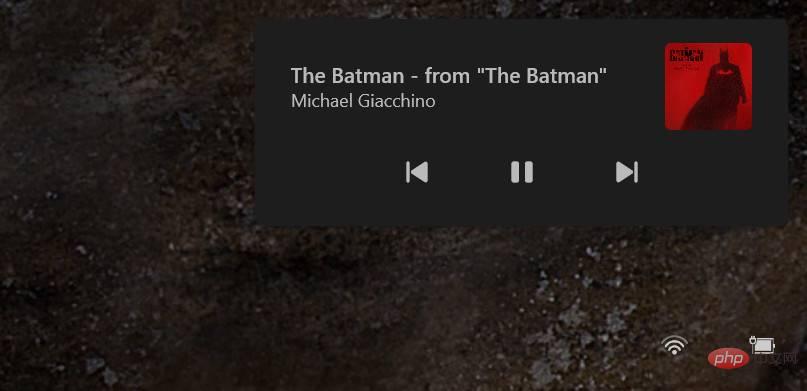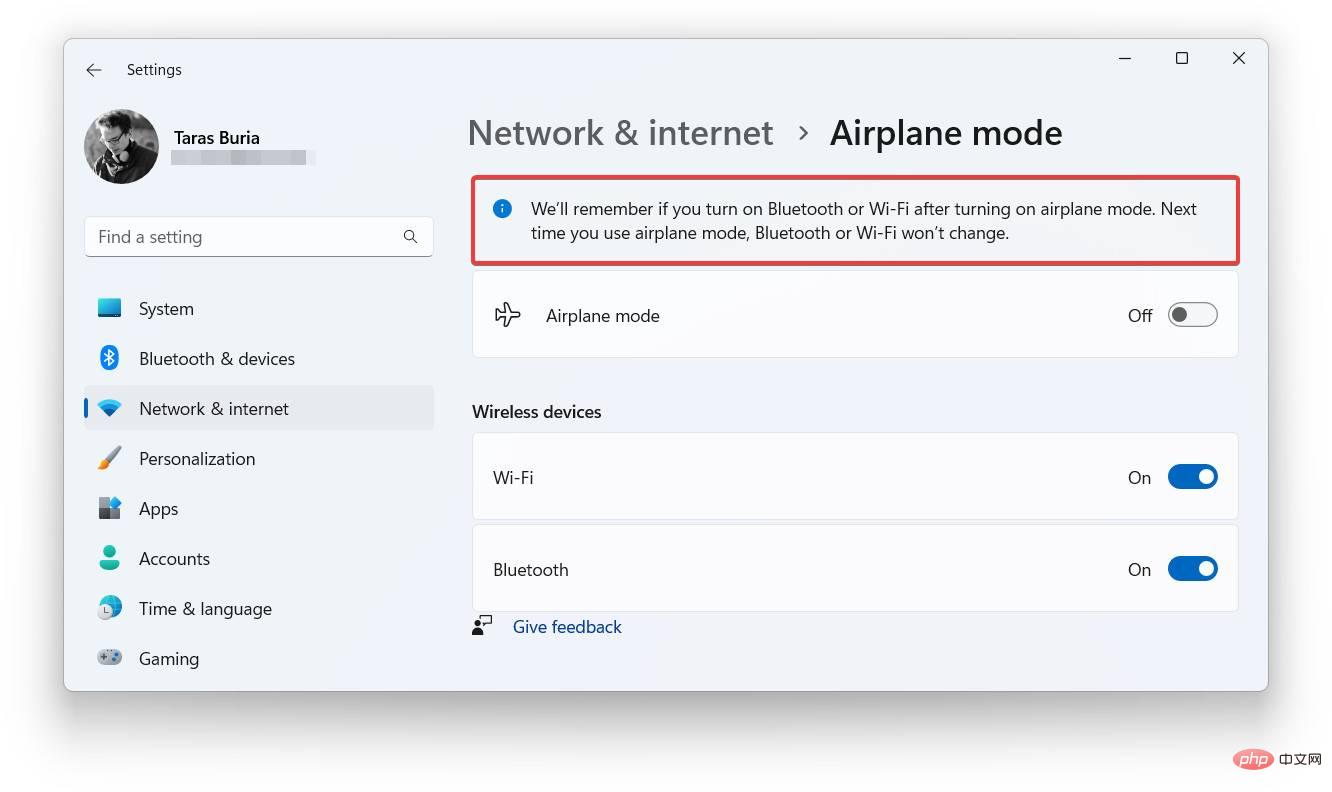 Common Problem
Common Problem
 What's new in Windows 11 22H2, the first feature update for the latest operating system
What's new in Windows 11 22H2, the first feature update for the latest operating system
What's new in Windows 11 22H2, the first feature update for the latest operating system
Start Menu and Taskbar Improvements
It’s safe to say that the Start Menu and Taskbar are the most controversial changes in Windows 11. Microsoft decided to create a completely new taskbar and Start menu for its latest operating system, and as a result, a lot of things got cut. New features and the lack of beloved features have upset many Windows 11 users, so Microsoft is looking to address the situation by equipping Windows 11 22H2 with several notable improvements to the taskbar area.
Drag and drop is back!
Perhaps the biggest complaint related to the taskbar in the initial release of Windows 11 was the lack of support for drag-and-drop. Windows 11 22H2 is here to fix this problem by allowing you to grab a file and drag it to an open app to bring it to the foreground. You can also drag the file to the "Show Desktop" area in the lower right corner to copy the file to the desktop.
The implementation is a bit weird. For example, Windows displays a stop icon when you hover a file over an open application. Technically, it does what it's supposed to do, but it feels like a traffic light that says green and red at the same time.

Another confusing thing is that the Start menu allows you to select ” list pins apps to the taskbar, but not from the Pinned section.
More Pins and Less Recommended Content
Microsoft doesn’t want to give Windows 11 users the option to get rid of the Recommended section in the Start menu, but it could You shrink it. The Start menu in Windows 11 22H2 has three new layouts: More Pins, Defaults, and More Suggestions. Disabling suggestions still leaves a large empty space in the Start menu.
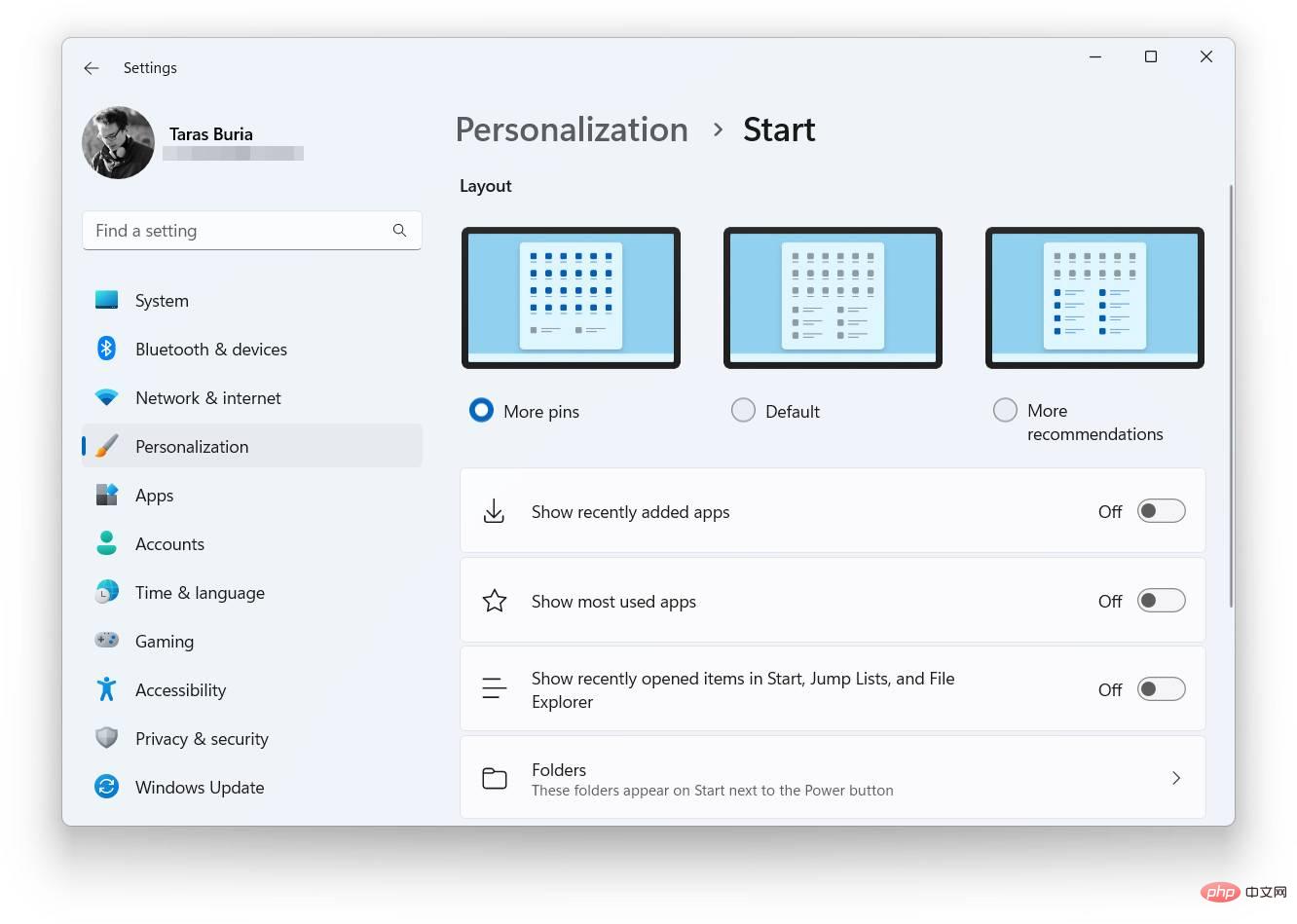
Also, you can enter Start menu settings faster by right-clicking on the open Start menu.
Folders on Start Menu
The Start Menu folder is another thing from Microsoft. After deleting it along with Live Tiles (RIP), it will bring Back to Windows 11. Folders on the Start menu now feel more generic and more Android/iOS-like. You can drag and drop an app onto another to create folders, add more apps, delete existing apps, and rename folders.
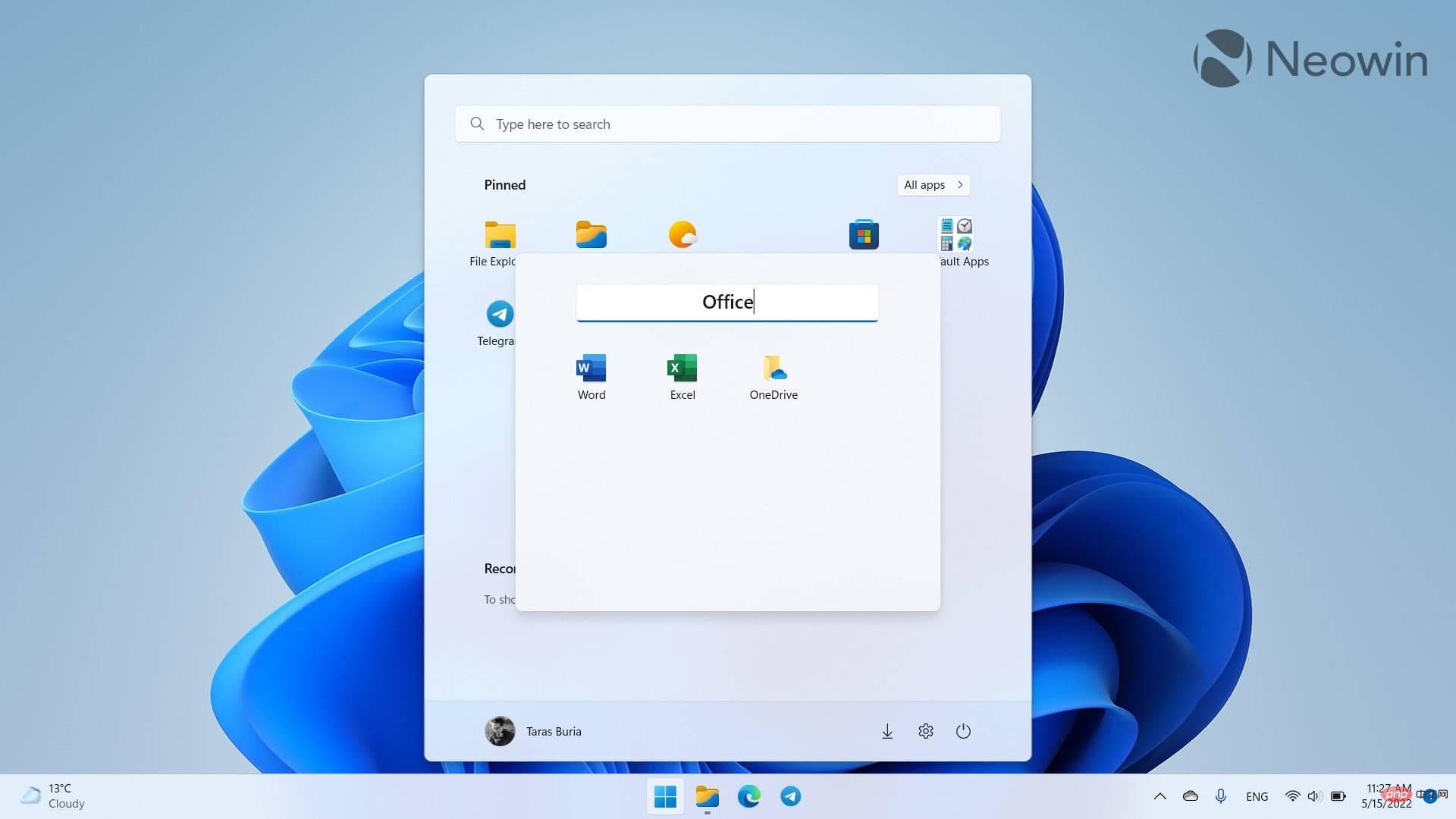
The only thing missing is the option to quickly delete folders by right-clicking. You need to drag each app out of the folder to delete it.
New touch gestures
The Start menu and taskbar are easier to operate in Windows 11 22H2 on touchscreen computers, thanks to several new gestures. Here they come:
- Swipe up and down from the taskbar to open and close the Start menu.
- Swipe left or right on the Start menu to switch between pinned apps and the All Programs list.
- Swipe up and down from the lower right corner of the screen to turn Quick Settings on and off.
Teams-specific taskbar improvements
Microsoft Teams users can now benefit from two convenient call-related features. The first is the ability to mute the microphone using the microphone icon in the notification area (developers can optimize their apps to support this feature in their messengers). The second lets you quickly share open windows. Hover over the application on the taskbar and click Share this window.
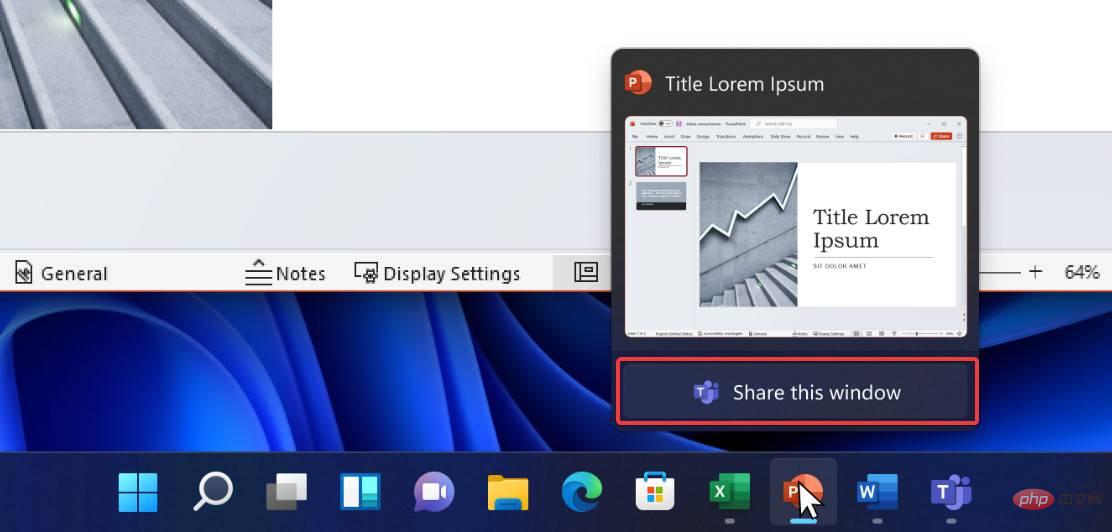
Improved Quick Settings for Bluetooth
Windows 11 22H2 brings an updated Quick Settings menu, with major improvements focused on Bluetooth. You don't need to navigate to the Settings app to quickly find and connect to Bluetooth devices. Many users wanted Microsoft to make this change, and we're glad to see Microsoft listened.
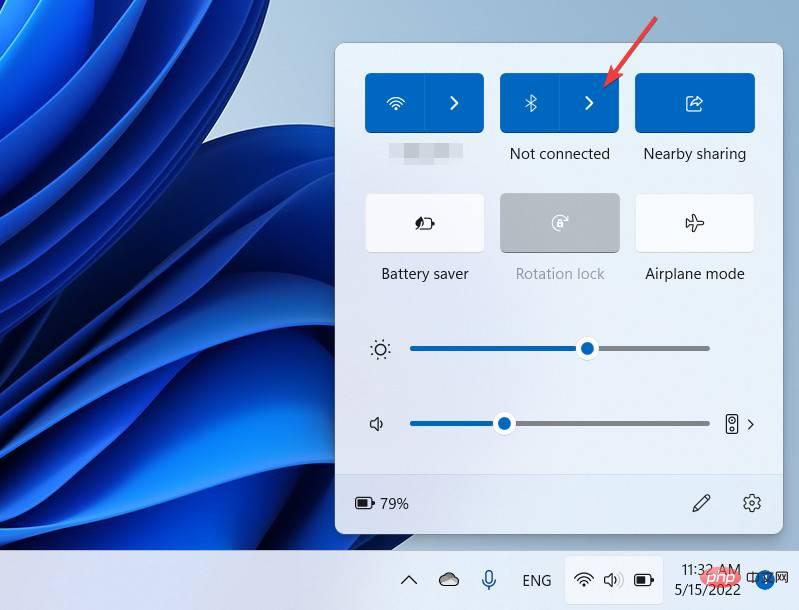
Speaking of quick settings, it’s also worth noting that Microsoft has redesigned the battery charging indicator. The new version is easier to read, especially when the battery is low. You'll find the same battery light on the lock screen.
File Explorer Improvements and Window Management
Microsoft promised to release a tabbed File Explorer for Windows 11, but as of this writing, this feature has not made it to Windows 11 22H2 candidate Version. Despite this, the operating system has received quite a few improvements and new features for File Explorer.
Pin files to Quick Access Favorites
File Explorer can now pin to not only Quick Access folders, but specific file. Additionally, Microsoft has renamed the Quick Access section to Favorites to help Windows users better understand how the section works. Do you have files that you access frequently? Just pin it to favorites to make it permanently available on your homepage.
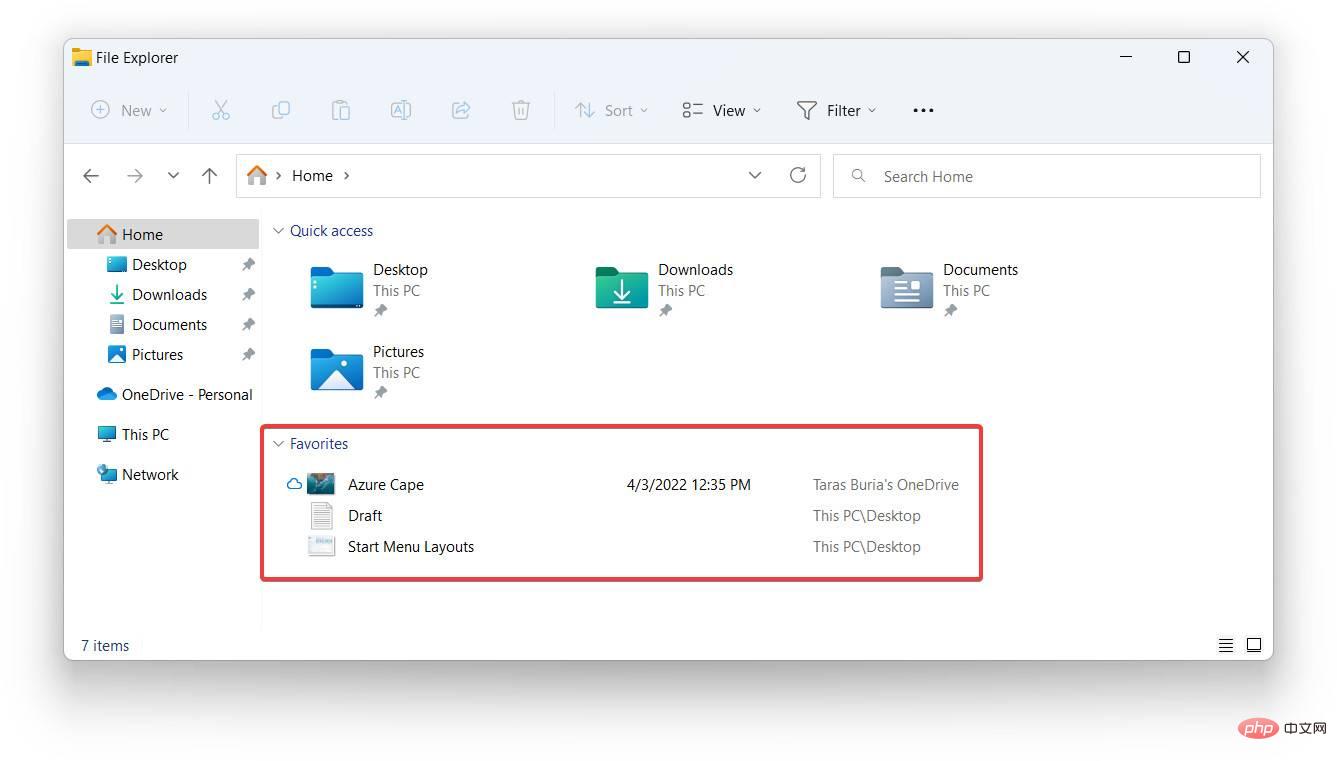
Folder Preview
This is another feature Microsoft is bringing back after killing it in the initial release of Windows 11 in 2021. File Explorer in Windows 11 22H2 can show previews on folder thumbnails.
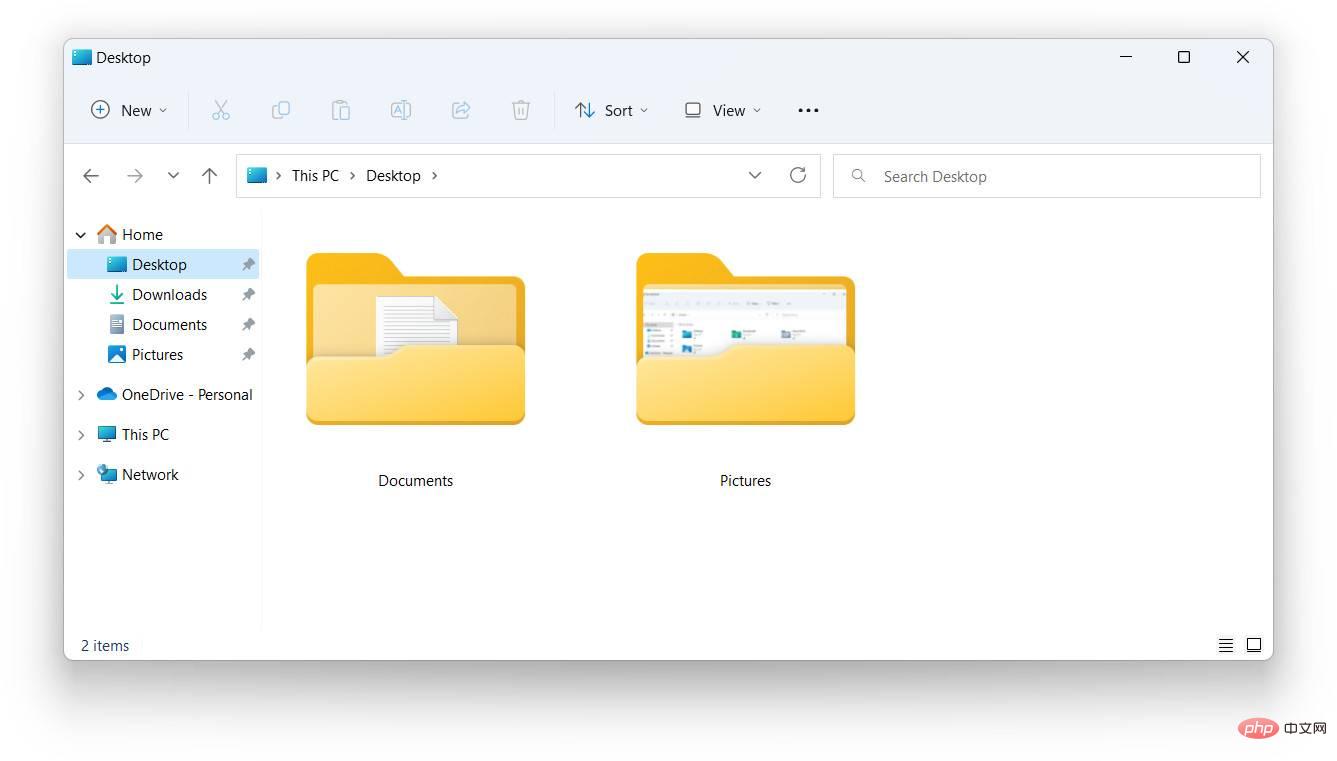
We should also note that you can customize folder thumbnails using a neat third-party app.
Better integration with OneDrive
With Windows 11 22H2, it’s now easier to check OneDrive status and storage. File Explorer receives a new button that triggers a flyout with OneDrive details. You can view remaining space, check sync status, open OneDrive for Web, and enter OneDrive settings. It's not the most groundbreaking change, but it makes using OneDrive in Windows 11 more convenient and intuitive.
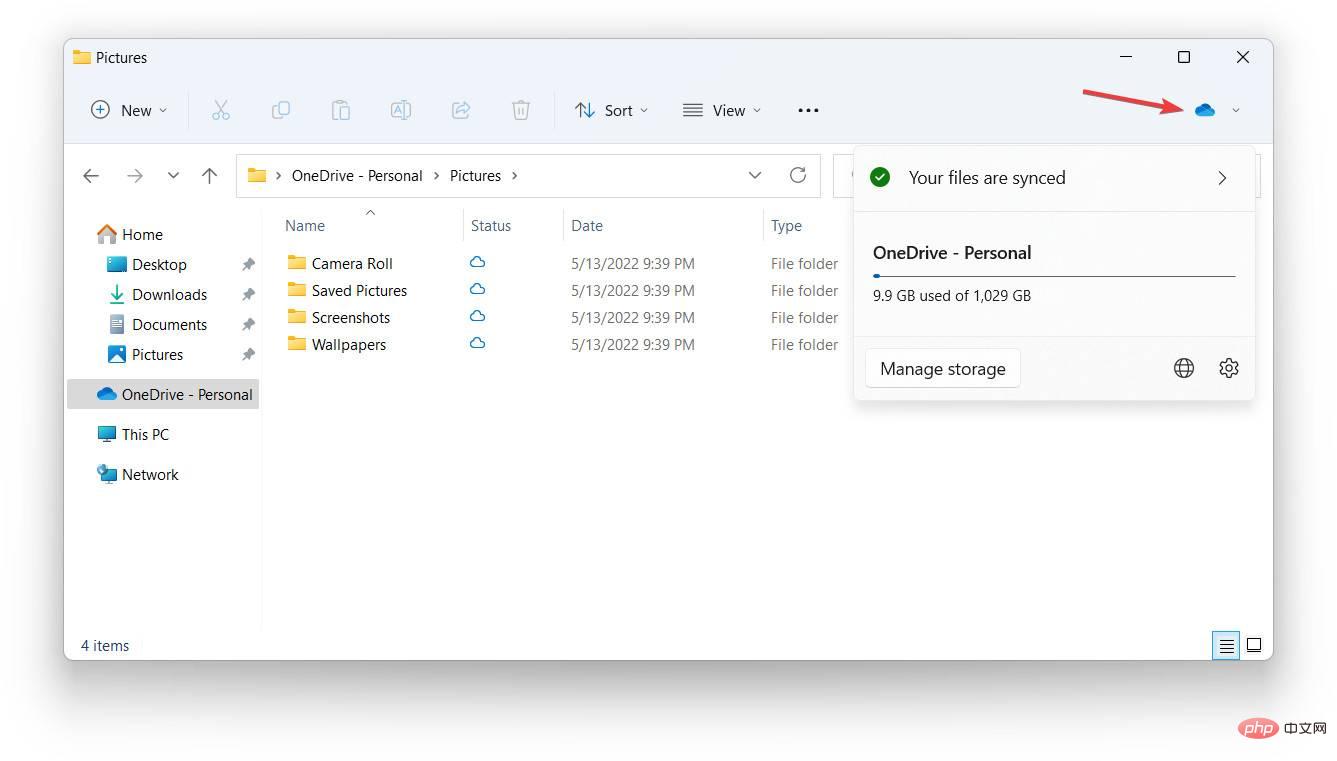
New shortcut for copying paths to files
Press Ctrl Shift C to copy the patch to the selected file without opening the context menu.
Improved snapshot layout
It is now easier to snap windows on the desktop using the touch screen or mouse. Grab a window and drag it to the top of the screen to reveal available snap layouts and quickly arrange other apps. This feature is customizable, so you can disable it if you don't like it.
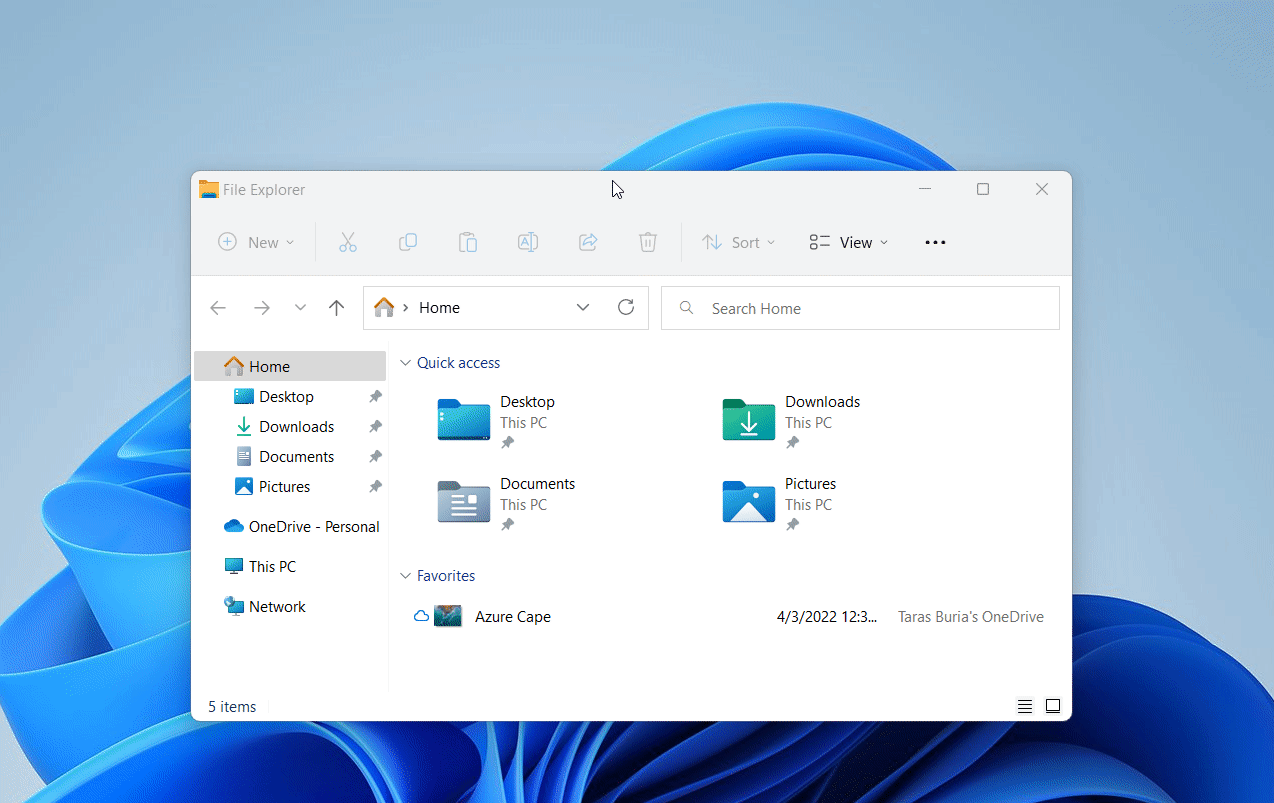
If you like using keyboard shortcuts to perform tasks, you'll be happy to know that you can now press Win Z and the corresponding number key to create a snapshot layout.
Previously, you could only trigger snapshot layout by hovering over the maximize/minimize buttons, which wasn't the most convenient option for tablets or PCs with touch screens.
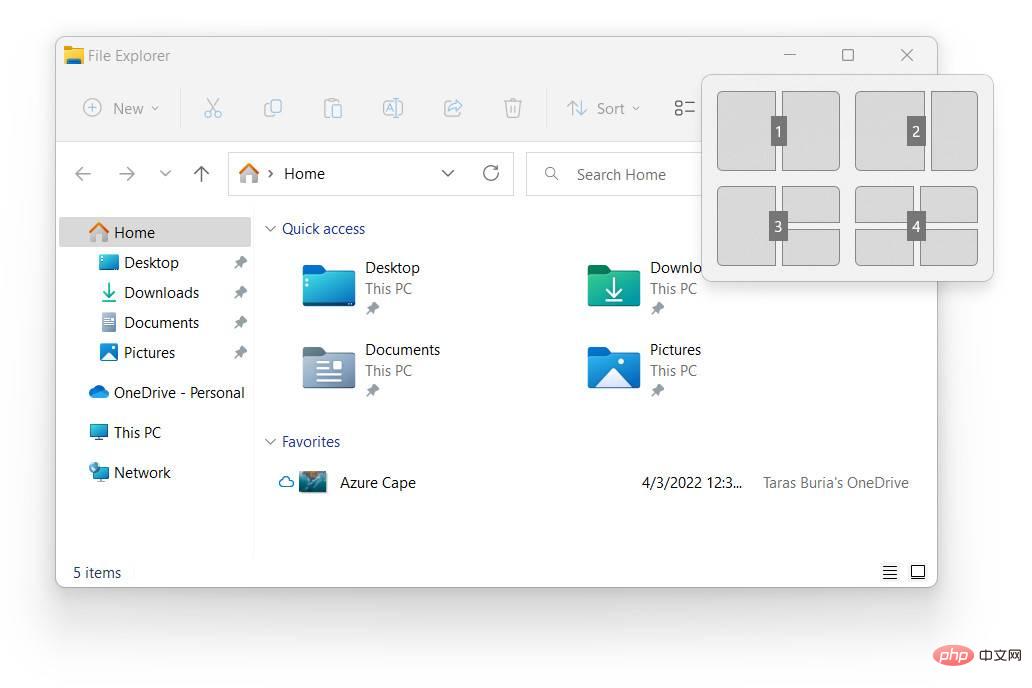
Various Noteworthy UI Changes
Ye-olde Windows 8 style volume slider is finally gone!
Microsoft has finally ditched the old and outdated Windows 8-style volume and brightness sliders. Instead, Windows 11 offers a clean, compact, and modern indicator located above the center of the taskbar.

Desktop Windows Spotlight
Windows 11 Spotlight extends to desktop. Now you can let Microsoft change your wallpaper using images pulled from Bing. This feature also makes it easy to access more information about a specific picture.
You can enable Windows Spotlight on your desktop by navigating to Settings > Personalization > Background > Personalize your background > Windows Spotlight. Note that opening Windows Spotlight places an additional icon on the desktop. Disabling Windows Spotlight is the only way to remove the icon.
Updated Lock Screen
The lock screen in Windows 11 has received updated media controls to follow the operating system’s general design language. It's a small change, but it helps create a slightly more consistent UI.
Updated icons and more mica effects
Microsoft has made some tweaks to make context menus easier to understand in Windows 11 . The company made changes to renaming, properties, and optimized icons to improve discoverability and consistency.
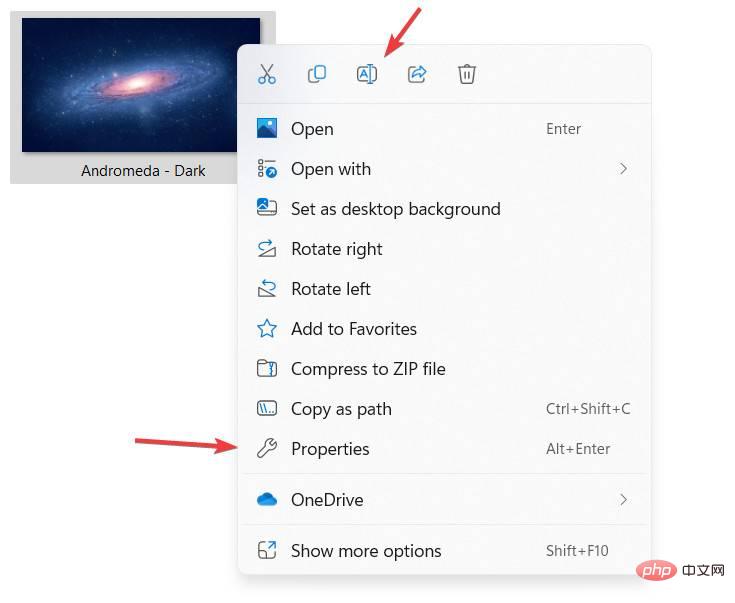
Finally, the mica effect now appears in more areas throughout the operating system, especially on window title bars.
Moving from Control Panel to Settings
Windows 11 22H2 continues the ongoing migration of legacy Control Panel to the “modern” Windows Settings app. In this version, Microsoft has made some changes to redirect the following sections of Control Panel to the Settings app:
- The Programs and Features section of the old Control Panel is now in Settings > Apps >> Open in the Settings app under the Installed Apps page.
- Uninstalling Windows Updates now happens in the Settings app instead of Control Panel.
- Some network and device entry points in Control Panel now redirect to the corresponding page in the Settings application.
- Finally, you can manage advanced sharing settings in Advanced Network Settings within the Settings app. This includes network discovery, file and printer sharing, and public folder sharing.
Redesigned and Improved Task Manager
New Design
After installing Windows 11 22H2, you will notice that Task Manager There's a completely new design (the first visual update since 2012), which follows Windows 11 UI principles. You still can't invoke Task Manager by right-clicking on the taskbar, but the app makes up for that with support for dark mode and the ability to follow system accent colors.
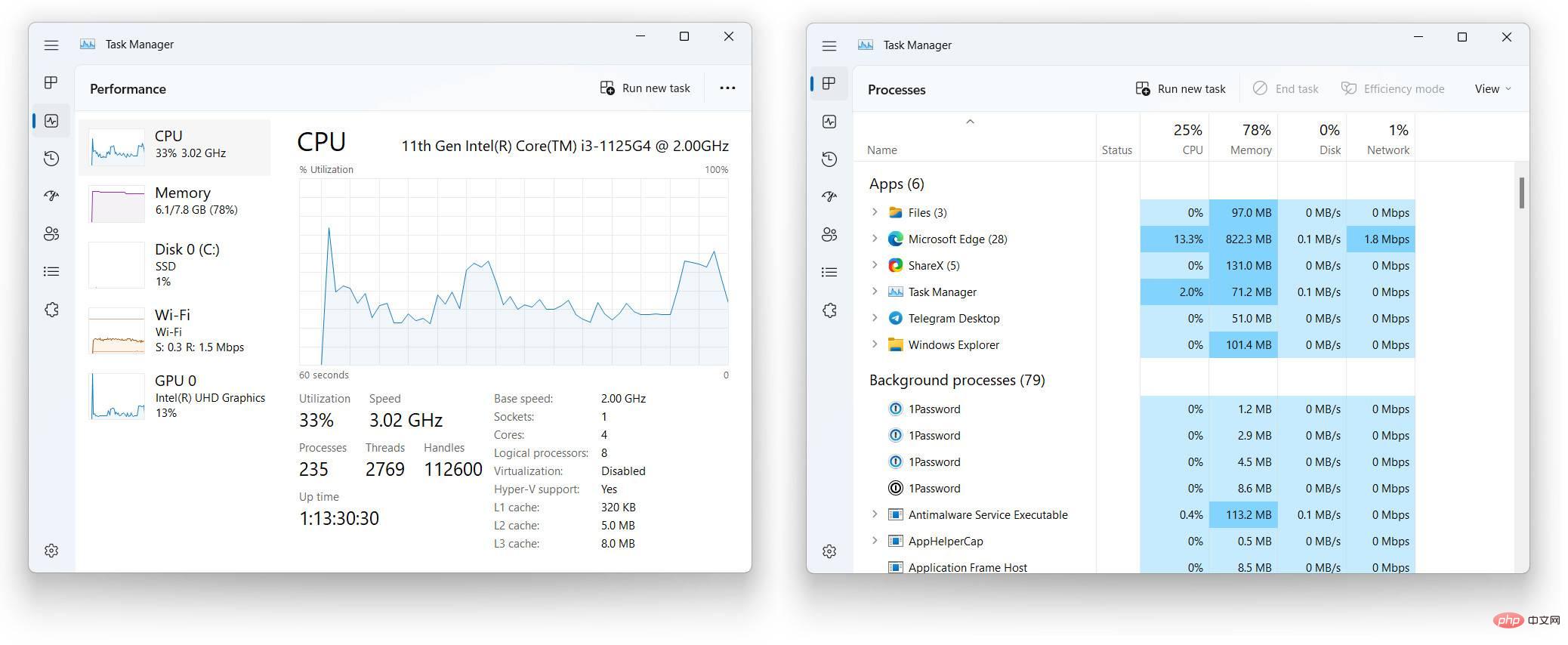
Productivity Mode
The redesigned UI isn’t the only change coming to Task Manager in Windows 11 22H2. The application now supports Efficiency Mode, which allows you to manually restrict applications or processes with high resource consumption. To switch a process to efficiency mode, right-click on it and select the appropriate option.
It is worth noting that you cannot apply efficiency mode to system processes or process groups.
Settings App Improvements
Do Not Disturb and Focus
Windows 11 22H2 brings proper Do Not Disturb mode and separate focus model. Do Not Disturb (formerly Focus Assist) is a more traditional way of turning off incoming notifications using various rules.
Focus is a slightly more advanced feature that allows you to create timers to focus on specific tasks and increase your productivity by reducing distractions. You can start a new session from the Clock app, the Settings app, or the calendar popup on the taskbar. Focus meetings can automatically activate Do Not Disturb mode, hide notification badges and disable icon flashing.
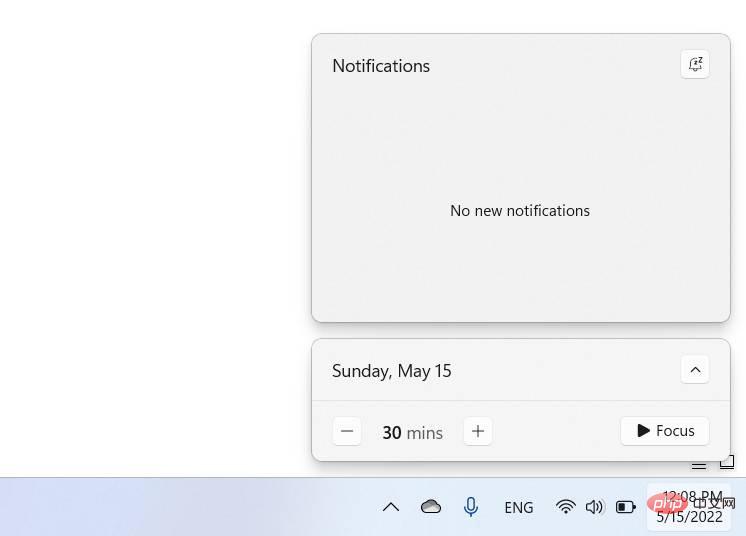
Overall, managing notifications and using Do Not Disturb mode in Windows 11 is easier to understand and customize.
Improved AirPods support
Windows 11 now works better with various AirPods models. The operating system gets wideband voice support to provide better audio quality for voice calls.
Faster animations on displays with high refresh rates
Dynamic refresh rates on supported devices with fast screens now work in many parts of the operating system, And not just in Office or while inking. Windows 11 can boost to 120Hz when displaying animations, scrolling, and moving the cursor. This will make the operating system feel smooth and more responsive on supported hardware.
Improved Airplane Mode
Windows can remember the status of available radios in airplane mode to keep them running the next time you switch modes.
Accessibility Improvements
There are not enough accessibility features in modern software. There is always room for improvement to make modern technology work better for people with physical limitations. With Windows 11 22H2, Microsoft is bringing several major new accessibility features.
System-wide live subtitles
Windows 11 22H2 brings system-wide on-device real-time subtitles. The operating system can automatically transcribe speech content from any audio source, including microphones. The latter means users with hearing problems can get subtitles and follow face-to-face conversations in real time.
When enabled, live captions appear at the top of the screen, just below where most computers have their cameras. This will help people follow the conversation and remain engaged in remote meetings. Microsoft allows the live caption panel to be moved to other locations at the user's convenience.
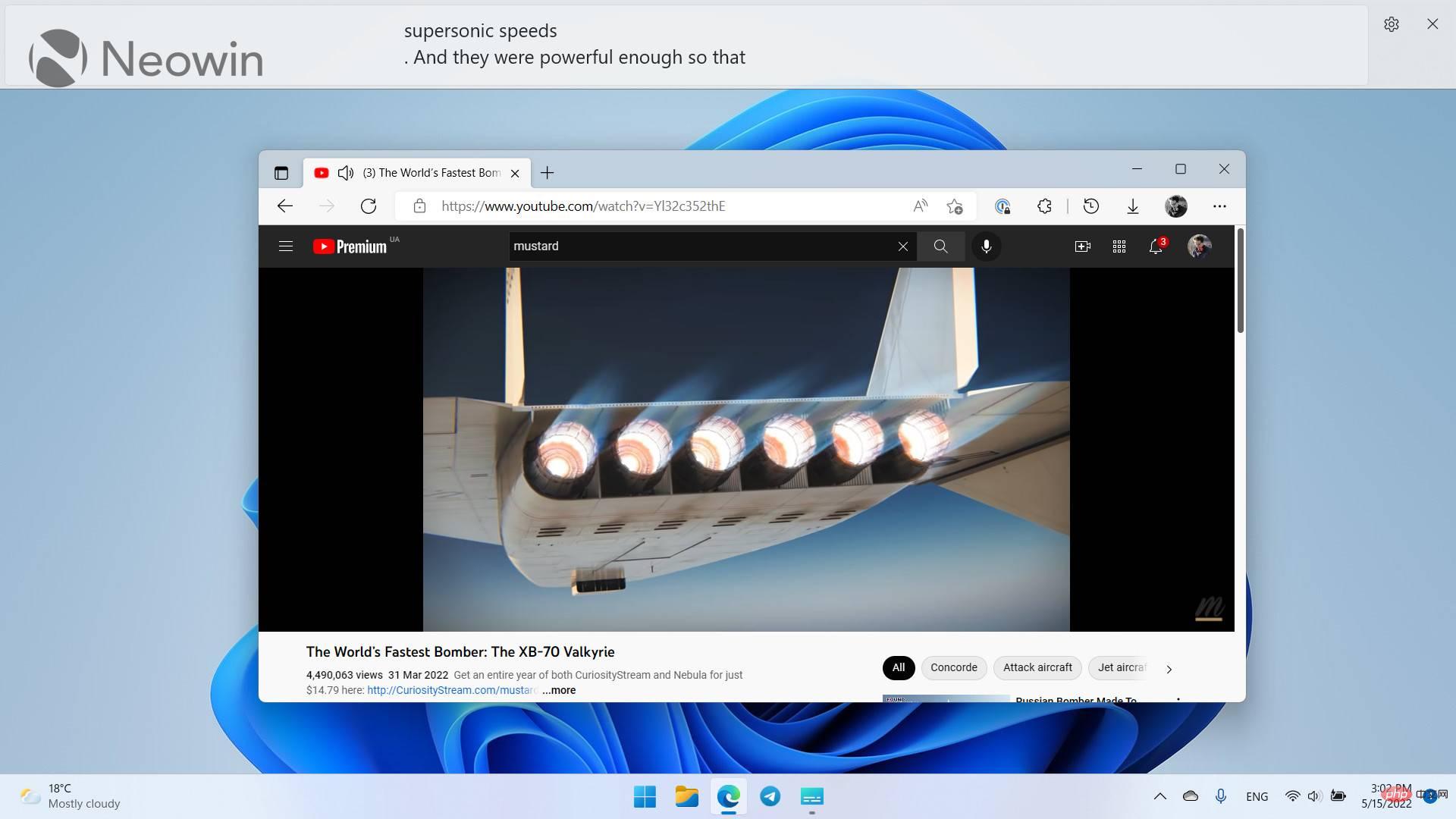
One of the best aspects of Live Subtitles in Windows 11 22H2 is that this feature does not require an active Internet connection and remains entirely local (you will need to download the feature pack on first boot). The only bad thing is that Live Captions currently only supports US English.
Voice Access
Voice Access is a new feature that allows you to control your computer with your voice. Once launched, Voice Access can show you an interactive tutorial with all the details about using it. One of the big changes that Voice Access brings is the ability to simulate standard input and clicks. Windows will display a grid overlay that you can use with your voice to tell the operating system where to click.
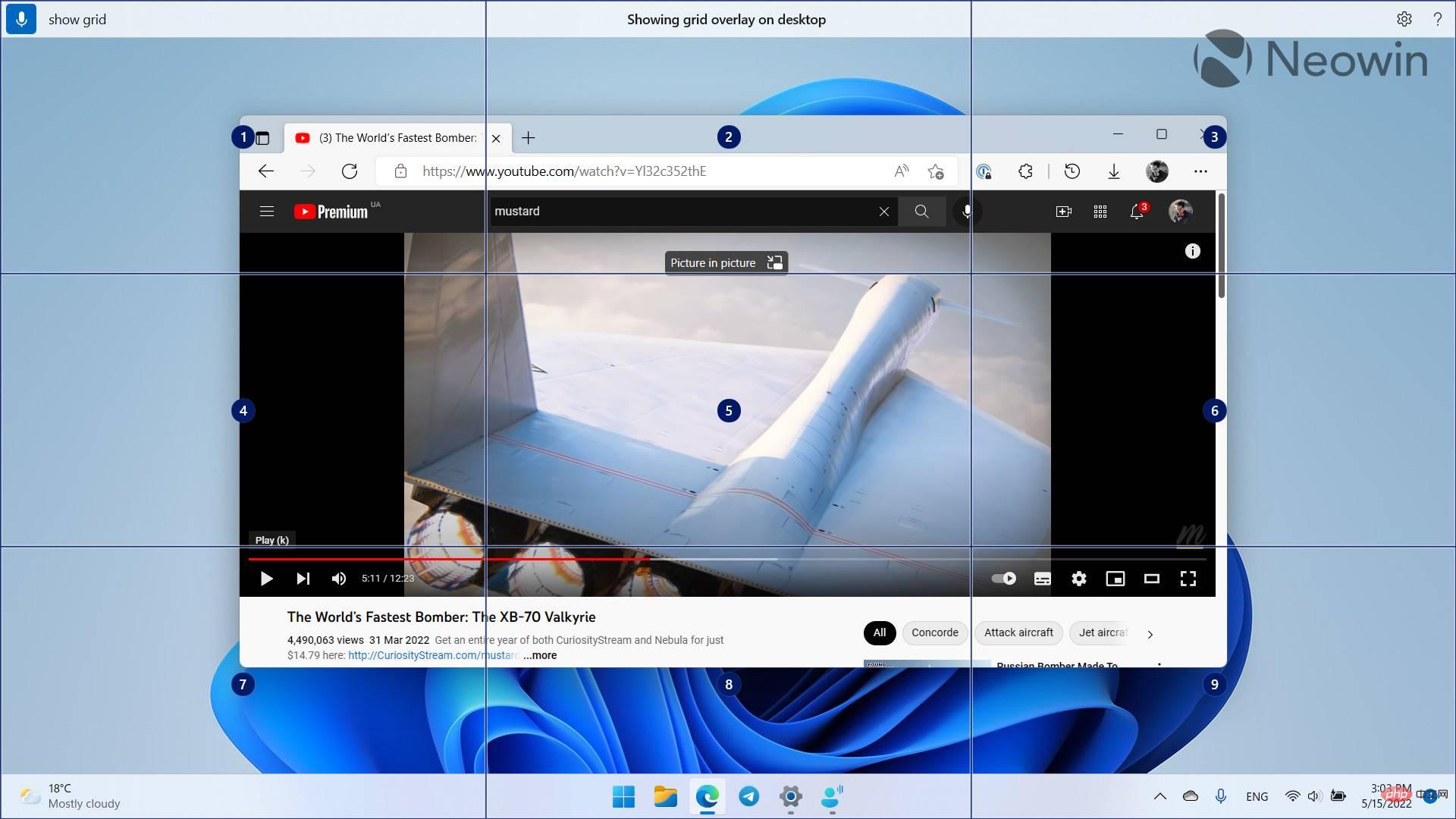
Like Live Subtitles, voice access does not require an internet connection and all processing data remains local. As for languages, currently only US English is available.
Natural Narrator
Finally, Windows 11 22H2 brings a more natural voice to Narrator (US English only). Those who rely on the default Windows screen reader will be happy to hear more human voices and less robotic voices. Again, no internet is required for this feature as all processing happens locally.
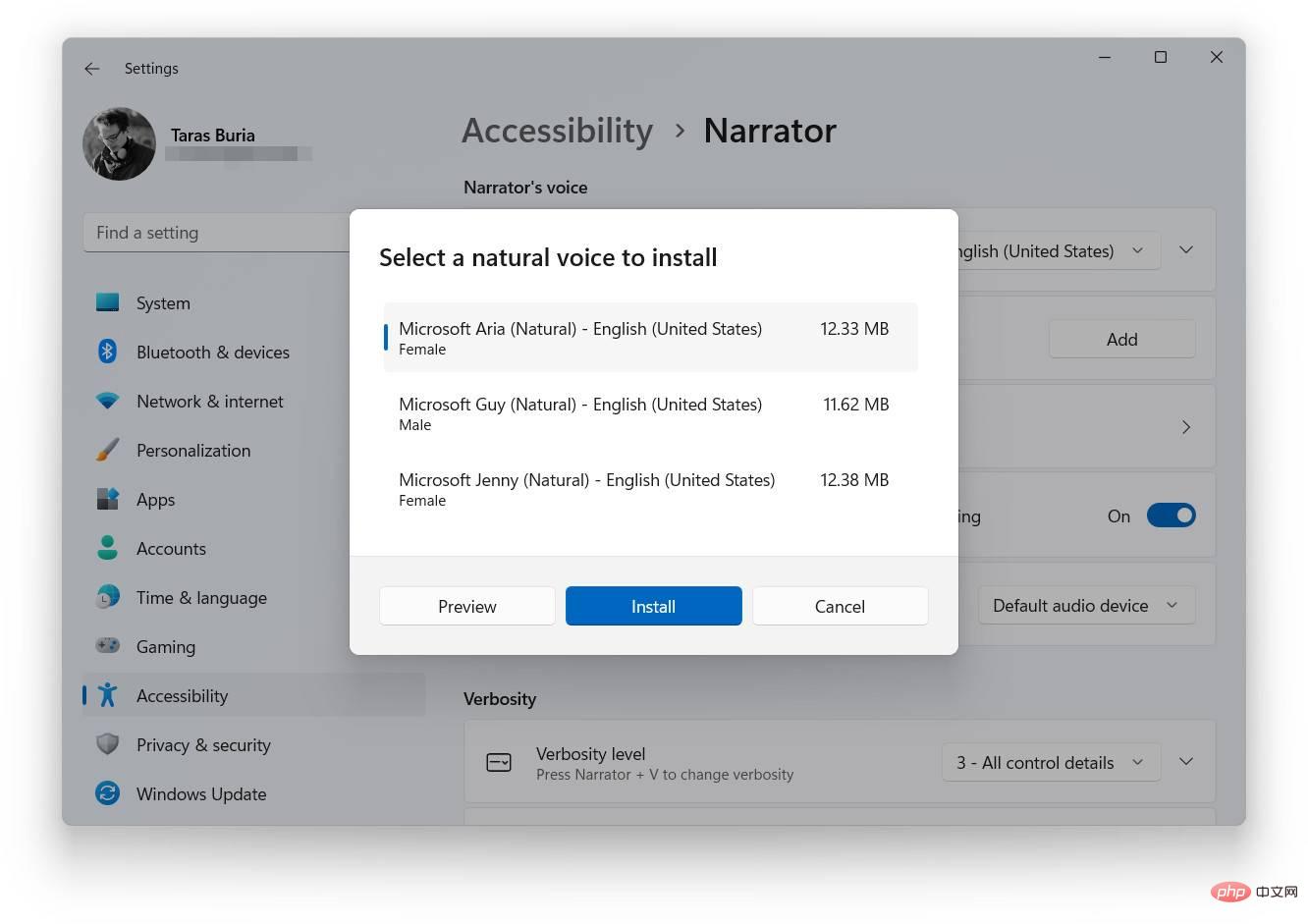
Windows 11 22H2 does not change the hardware requirements. You still need a relatively modern processor and a TPM chip to officially run the operating system. What has changed is the initial setup process. Now, all SKUs must have an active Internet connection, and you need to use a Microsoft login account (you can try this tutorial to bypass this restriction).
Another thing that can annoy you is updated searches. It's still pretty silly (try searching "recycle bin"), but now there's more recommended content, or just ads. Additionally, many of the best features are region-locked. Want to do basic calculations but live outside the United States? Well, too bad.
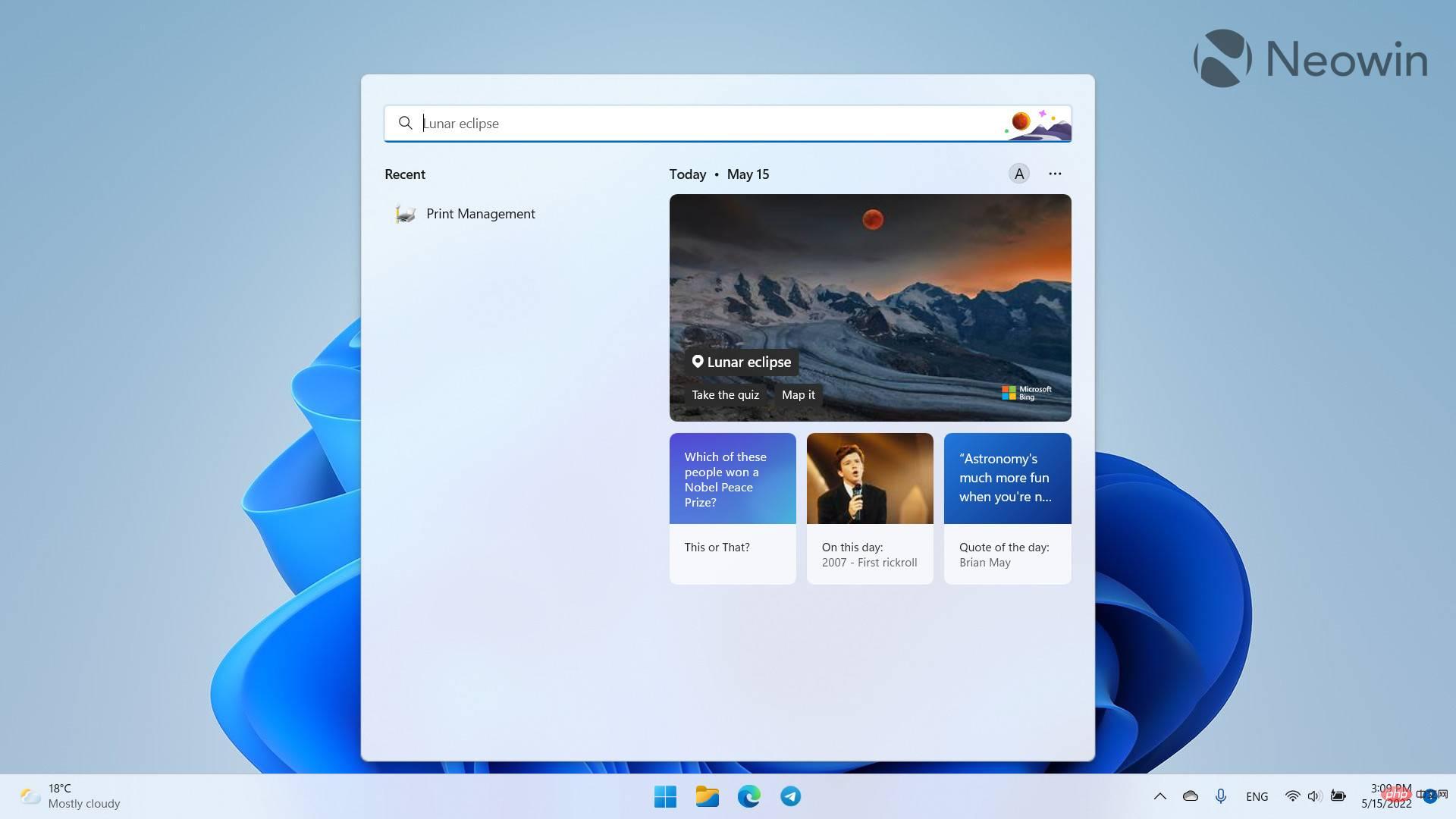
Microsoft has somehow managed to make the less useful and less smart Windows Widgets borderline annoying. Windows 11 mixes standard widgets with a variety of news and stories from a clean install, so finding the widget you need will keep you scrolling through tabloid news and other ads. Fortunately, Microsoft will respect the widget layout on systems upgraded from the initial Windows 11 version to version 22H2.
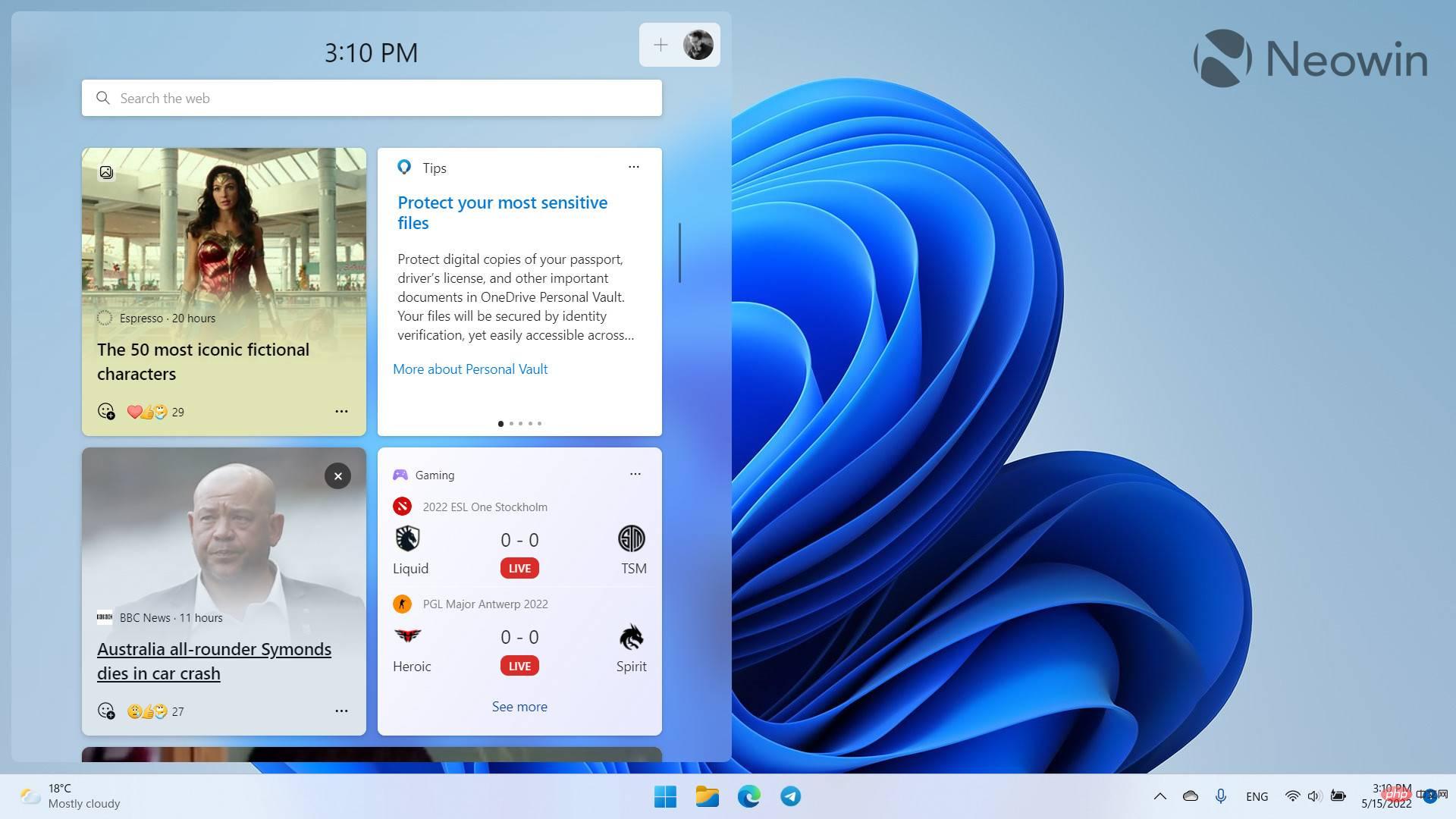
Despite numerous rumors, Windows 11 22H2 still won’t allow third-party developers to create and distribute custom Windows widgets. Some stock widgets are still your only option, now fully blended with the yellow press.
The above is the detailed content of What's new in Windows 11 22H2, the first feature update for the latest operating system. For more information, please follow other related articles on the PHP Chinese website!

Hot AI Tools

Undresser.AI Undress
AI-powered app for creating realistic nude photos

AI Clothes Remover
Online AI tool for removing clothes from photos.

Undress AI Tool
Undress images for free

Clothoff.io
AI clothes remover

Video Face Swap
Swap faces in any video effortlessly with our completely free AI face swap tool!

Hot Article

Hot Tools

Notepad++7.3.1
Easy-to-use and free code editor

SublimeText3 Chinese version
Chinese version, very easy to use

Zend Studio 13.0.1
Powerful PHP integrated development environment

Dreamweaver CS6
Visual web development tools

SublimeText3 Mac version
God-level code editing software (SublimeText3)

Hot Topics
 1659
1659
 14
14
 1415
1415
 52
52
 1309
1309
 25
25
 1257
1257
 29
29
 1231
1231
 24
24
 What software is crystaldiskmark? -How to use crystaldiskmark?
Mar 18, 2024 pm 02:58 PM
What software is crystaldiskmark? -How to use crystaldiskmark?
Mar 18, 2024 pm 02:58 PM
CrystalDiskMark is a small HDD benchmark tool for hard drives that quickly measures sequential and random read/write speeds. Next, let the editor introduce CrystalDiskMark to you and how to use crystaldiskmark~ 1. Introduction to CrystalDiskMark CrystalDiskMark is a widely used disk performance testing tool used to evaluate the read and write speed and performance of mechanical hard drives and solid-state drives (SSD). Random I/O performance. It is a free Windows application and provides a user-friendly interface and various test modes to evaluate different aspects of hard drive performance and is widely used in hardware reviews
 What should I do if the Win7 taskbar does not display the icon? How to solve the problem of the computer taskbar icon disappearing
Jun 09, 2024 pm 01:49 PM
What should I do if the Win7 taskbar does not display the icon? How to solve the problem of the computer taskbar icon disappearing
Jun 09, 2024 pm 01:49 PM
Recently, many users using Win7 system have found that the icons in the taskbar suddenly disappeared, which makes the operation very inconvenient and they do not know how to solve the problem. This article will introduce to you how to solve the problem of disappearing taskbar icons in Win7 system. Bar! Cause Analysis When encountering such a situation, there are generally two situations: one is that the taskbar on the computer does not really disappear, but is just hidden, and the other is that the taskbar does disappear. Method 1: 1. There is a situation that you need to confirm first, that is, when the mouse is placed at the bottom of the screen, the taskbar will be displayed. You can directly click the mouse on the taskbar and select "Properties". 2. In the dialog box that opens, click & on the "Hide taskbar" option.
 How to make the Win11 taskbar black? Introduction to how to set the black taskbar in Win11
Apr 22, 2024 pm 06:40 PM
How to make the Win11 taskbar black? Introduction to how to set the black taskbar in Win11
Apr 22, 2024 pm 06:40 PM
Some friends also want the taskbar to turn black after changing the dark wallpaper on their computers, but they don’t know how to do it. Let’s take a look at the specific methods below! 1. Right-click an empty area in the taskbar and select "Taskbar Settings." 2. In the taskbar settings window, find the "Appearance" tab and click it. 3. Under the "Appearance" tab, find the "Taskbar Background" option and click the drop-down menu. 4. Select "Black". 5. Close the "Taskbar Settings" window. Taskbar beautification Xiaozhi Eye Protector is a very easy-to-use win11 transparent taskbar tool. It supports taskbar transparency, taskbar beautification, and multiple styles to beautify the taskbar interface, making your computer interface more beautiful. Xiaozhi Eye Protector Eye Baby (click to download now) Xiaozhi Eye Protection
 CrystalDiskinfo usage tutorial-What software is CrystalDiskinfo?
Mar 18, 2024 pm 04:50 PM
CrystalDiskinfo usage tutorial-What software is CrystalDiskinfo?
Mar 18, 2024 pm 04:50 PM
CrystalDiskInfo is a software used to check computer hardware devices. In this software, we can check our own computer hardware, such as reading speed, transmission mode, interface, etc.! So in addition to these functions, how to use CrystalDiskInfo and what exactly is CrystalDiskInfo? Let me sort it out for you! 1. The Origin of CrystalDiskInfo As one of the three major components of a computer host, a solid-state drive is the storage medium of a computer and is responsible for computer data storage. A good solid-state drive can speed up file reading and affect consumer experience. When consumers receive new devices, they can use third-party software or other SSDs to
 How to solve the problem that the win11 taskbar does not respond when clicked/cannot be used
May 09, 2024 pm 06:43 PM
How to solve the problem that the win11 taskbar does not respond when clicked/cannot be used
May 09, 2024 pm 06:43 PM
After upgrading to Windows 11 system, many users encountered the problem that the taskbar cannot be clicked, which has a great impact on life and work. So how to solve it specifically? Let’s take a look below! Method 1 1. First, we press the Ctrl+Shift+Esc shortcut keys on the keyboard to open the Task Manager. 2. Then click File in the upper left corner and select Run New Task. 3. After opening it, enter control and press Enter to enter the control panel. 4. Find the time and area and choose to change the date and time. 5. Change the time to September 4 or later, turn off automatic time synchronization after the setting is completed, and then restart the computer. 6. After restarting, re-enter the time settings and come to the internet time selection.
 How to set the Win11 taskbar to be fully transparent? Detailed guide to setting up 100% transparency for the Win11 taskbar
May 09, 2024 pm 01:22 PM
How to set the Win11 taskbar to be fully transparent? Detailed guide to setting up 100% transparency for the Win11 taskbar
May 09, 2024 pm 01:22 PM
Windows 11 is the latest operating system launched by Microsoft. It adopts a new interface design and interaction method. Many users will habitually set the taskbar to be fully transparent. So how should they do it? Let’s take a look below! Basic settings 1. Right-click a blank space on the taskbar and select "Taskbar Settings". 2. In the "Personalization" tab, find the "Theme" option. 3. Scroll to the bottom and find the "Transparency" option. 4. Adjust the "Transparency" slider to the far right to set the taskbar to be fully transparent. The third-party tool Xiaozhi Eye Protection is an efficient eye protection software that effectively filters screen blue light. Compared with Eye Protection Wizard and Eye Protection Guardian, we provide a variety of eye protection color adjustments to meet the needs of color-sensitive groups at all times of the day. Eye protection requirements
 How to solve the problem that the taskbar cannot be resized in Windows 11 system
Apr 17, 2024 pm 06:40 PM
How to solve the problem that the taskbar cannot be resized in Windows 11 system
Apr 17, 2024 pm 06:40 PM
Recently, some Windows 11 users have found that the size of the taskbar cannot be freely scaled according to personal preferences, especially when they want to increase or decrease the size of the taskbar. In order to solve the troubles faced by these users, this article will focus on the problem that the taskbar size cannot be adjusted in Windows 11 system and provide relevant solutions. Operation method 1. Click Start in the taskbar in the lower left corner, enter "Registry Editor" in the search box above and open it. 2. After entering the new interface, click "HKEY_CURRENT_USERSoftwareMicrosoftWindowsCurrentVersionExpl" in the left column
 How to solve: The problem that the software icon cannot be fixed on the Win11 taskbar
May 09, 2024 pm 05:31 PM
How to solve: The problem that the software icon cannot be fixed on the Win11 taskbar
May 09, 2024 pm 05:31 PM
Win11 is one of the systems used by many people, but recently many users are saying that the Win11 taskbar cannot fix software icons. How to solve it specifically? Let’s take a look below! Restart your computer. Sometimes, some minor system problems may be temporary and can be solved by restarting the computer. If the software icon still cannot be fixed after restarting, then you need to perform some further operations. Log in to the system account again. It may be that there is some abnormality in the current account, which prevents the software icon from being fixed. We can try to switch to another account to log in, or log out of the current account and log in again to see if this problem can be solved. Reset the taskbar. In Win11 system, right-click the taskbar to enter the taskbar settings interface.


